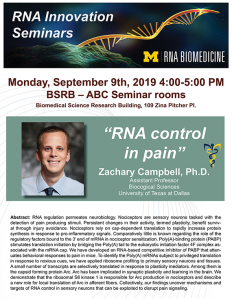Presented By: Center for RNA Biomedicine
RNA innovation Seminar
Zachary Campbell, Ph. D., Assistant Professor, University of Texas at Dallas

Abstract: RNA regulation permeates neurobiology. Nociceptors are sensory neurons tasked with the detection of pain producing stimuli. Persistent changes in their activity, termed plasticity, benefit survival through injury avoidance. Nociceptors rely on cap-dependent translation to rapidly increase protein synthesis in response to pro-inflammatory signals. Comparatively little is known regarding the role of the regulatory factors bound to the 3' end of mRNA in nociceptor sensitization. Poly(A)-binding protein (PABP) stimulates translation initiation by bridging the Poly(A) tail to the eukaryotic initiation factor 4F complex associated with the mRNA cap. We have developed an RNA-based competitive inhibitor of PABP that attenuates behavioral responses to pain in mice. To identify the Poly(A) mRNAs subject to privileged translation in response to noxious cues, we have applied ribosome profiling to primary sensory neurons and tissues. A small number of transcripts are selectively translated in response to plasticity mediators. Among them is the capsid forming protein Arc. Arc has been implicated in synaptic plasticity and learning in the brain. We demonstrate that the ribosomal S6 kinase 1 is responsible for Arc production in nociceptors and describe a new role for local translation of Arc in afferent fibers. Collectively, our findings uncover mechanisms and targets of RNA control in sensory neurons that can be exploited to disrupt pain signaling.